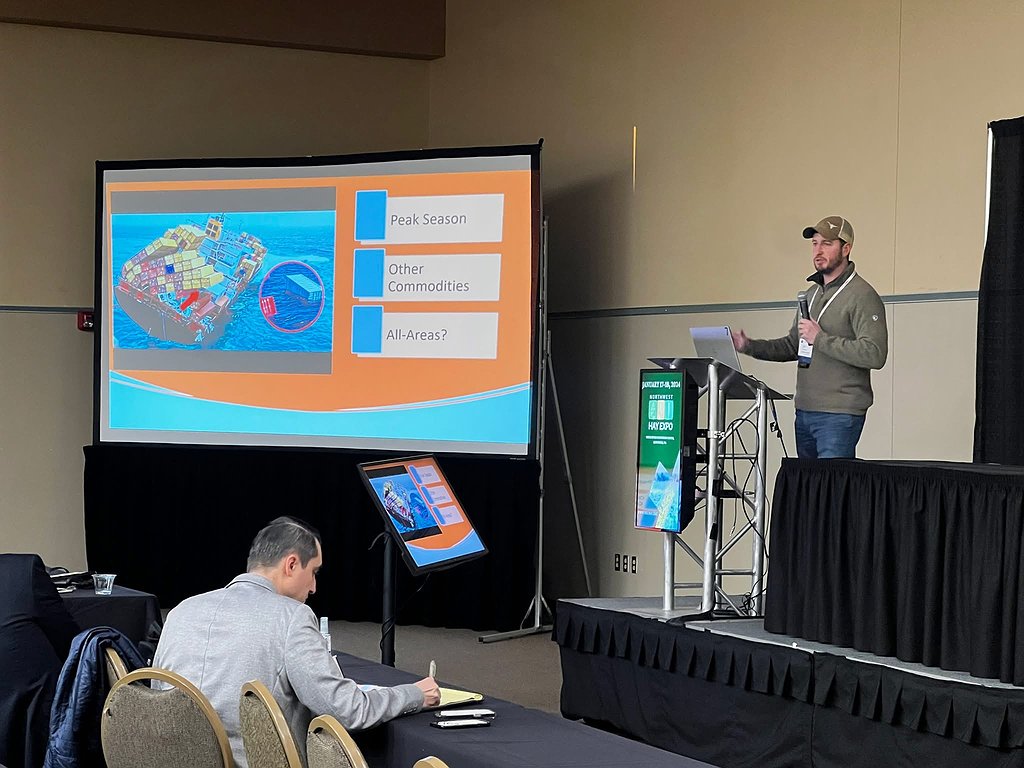Excitement builds for the 2025 Northwest Hay Expo
KENNEWICK — The annual Northwest Hay Expo is once again set to attract agriculture professionals to Kennewick, Washington, on January 15 and 16, 2025. As the largest hay and forage expo on the West Coast, this event promises to be both an educational and networking hub for industry leaders from Washington, Oregon, and Idaho.
“This is a day and a half of educational and networking events with members of the hay and forage industry,” said Andrew Eddie, President of the Washington Hay Growers Association. “You can meet and network with a bunch of people from the forage industry, and kind of see new product offerings, or touch base with suppliers. It’s a very good educational event.”
Last year’s event recorded between 400 and 600 attendees, and the anticipation is similar for the upcoming gathering.
The 2025 Northwest Hay Expo will feature a variety of presentations focused on critical topics affecting the hay and forage sectors.
Attendees can expect to hear from leading experts in the field, including Dr. Steve Norberg from Washington State University. His presentations will cover “Optimum Nitrogen Rates for Timothy” and “Alfalfa Variety Trial Results in 2023,” providing valuable insights into crop management. Norberg holds a doctorate in Agronomy and Crop Science and a Master of Science in the same discipline.
Another notable presentation will be “The World of Plant Hormones and their Influence on Alfalfa Quality and Yield” by Kayla Huckleberry and Tyson Brooks from Stoller USA. This session aims to shed light on the often-overlooked impact of plant hormones on crop performance.
Josh Callen from The Hoyt Report will address attendees in his presentation, “Status of the Western Hay Market,” where he will provide critical analyses and forecasts about market trends.
Meanwhile, Brady Stover from Yara North America will offer an update on the fertilizer market, helping producers understand current conditions that affect their operations.
The final presentation, “Sifting Grain from Chaff in Soil Health and Regenerative Agriculture,” will be delivered by Andy McGuire from WSU Extension, Moses Lake. This session will explore innovative methods of promoting soil health through regenerative practices, which are increasingly vital for sustainable agriculture.
“My favorite part of the Hay Expo is just the networking and education on where things are heading,” Eddie said. “We need to maintain profitability and understand how the hay and forage industry is evolving.”
The economic backdrop for the hay industry has been challenging, with commodity prices lower than usual across the board. Nevertheless, Eddie believes attending the Expo will provide solutions.
“Just the wealth of knowledge and networking is invaluable,” he said. “It’s a good way to meet very smart people and educate yourself on what to do differently in your operation.”
In terms of logistics, attendance at the Northwest Hay Expo does come with a fee.
For those who are non-members it’s $150, for those who want growers membership and admission it’s $175, and for those who want associate membership and admission it’s $195.
People can also register their farm of up to five for $425.
This fee not only allows access to the Expo but also includes membership dues for those who want to join the Washington Hay Growers Association.
“You can show up and pay for admittance,” Eddie said. “When you get there, the membership dues total will essentially give you access to updates from the board, industry news, and a listing in the hay directory.”
This tiered pricing structure is designed to enhance the experience for attendees, ensuring that discussions and engagements are still focused and intentional.
The Northwest Hay Expo is not just an event; it is a platform for the agricultural community to collaborate on challenges and future opportunities, particularly as the industry navigates fluctuating markets, according to Eddie.
“We have a lot of industry support from local and national companies that see the significance of what the hay and forage industry provide, especially in Washington,” Eddie said.




